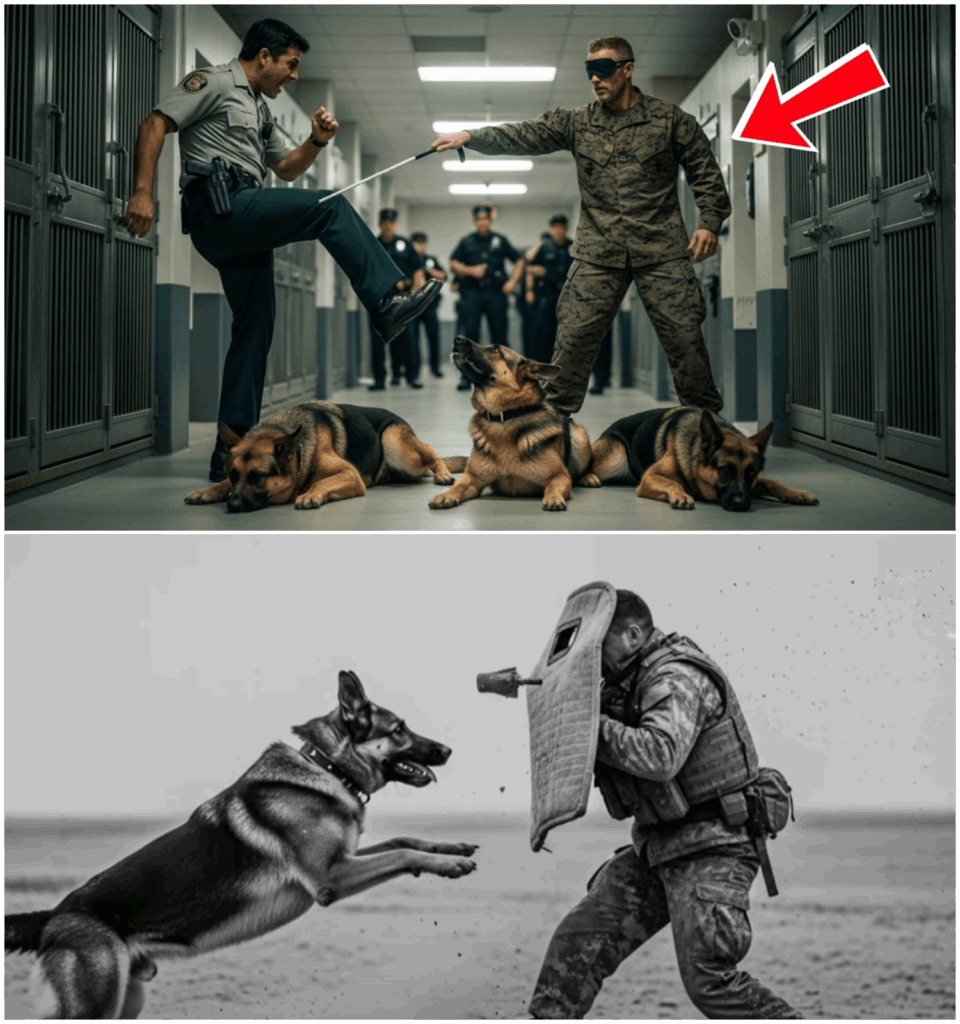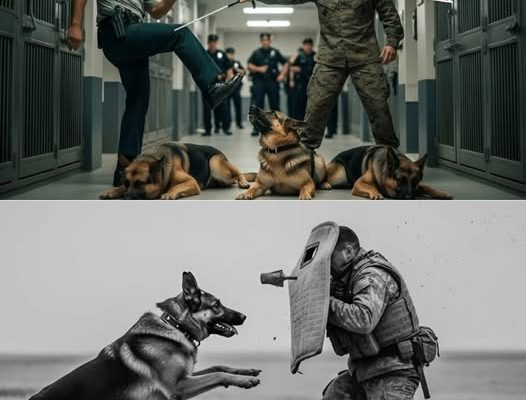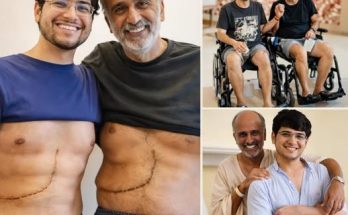He wasn’t supposed to survive. Travis Marorrow, a retired U.S. Marine, had been left blind and forgotten by the world, stumbling through life with only the sound of his cane and a heart full of silence. His days in Flagstaff, Arizona, passed quietly, the isolation of his cabin deepened by the loss of his sight and the comrades he’d never see again. Yet, fate has a way of finding those who need it most.
One late March evening, as the sun bled through the pine canopy and the last patches of snow clung to the forest floor, Travis’s twelve-year-old niece, Eliza, begged him to visit the Northern Paws Rescue Center. Eliza, with her windchime laughter and untamable compassion, was the only person Travis let break the silence in his life. She always tried to save animals—half-frozen kittens, abandoned puppies, broken birds. When she asked him to come with her, he couldn’t say no, even if he didn’t actually say yes.
Northern Paws had once been a proud place, known for rehabilitating difficult dogs. But things had changed under a new manager, Rick Delaney, a man whose clipped authority demanded obedience but offered little kindness. The shelter was quieter now, the dogs’ barks replaced by an unnatural hush. When Travis and Eliza arrived, the stillness unsettled him. He let Eliza wander ahead while he stood in the central corridor, listening.
That’s when he heard it—a sharp, guttural yelp from the back kennels, followed by silence. Not the bark of a lonely dog, but a choked, fearful sound. Travis’s instincts, honed in war, prickled. He heard a faint whistle, the same pattern used with K9 units in Afghanistan, and then the low hiss of something cutting the air—a leash, or a belt. His jaw tightened. The scent of pine faded, replaced by diesel, dust, and blood. He remembered Tango, the German Shepherd who had saved his life in Helmand Province, and the pain of loss returned.

Eliza came back, excited about a shepherd mix named Juno, but concerned about the back kennels—off-limits to visitors. Travis asked her to wait in the car. Rick returned, his voice tight and impatient when Travis questioned the dogs’ pain. “They’re trauma cases,” Rick said. “Better if visitors don’t go near them.” But Travis knew trauma didn’t make you quiet. It made you scream.
That night, Travis couldn’t sleep. The sounds from the shelter echoed in his mind. He rose after midnight and, guided by memory, crossed the forest path to Northern Paws. He scaled the fence with the ease of a man who’d survived worse. The shelter was still. He moved toward the back kennels—always reserved for “high-risk” dogs. There, he heard three distinct rhythms of breath. He knelt by the first kennel. “Easy,” he whispered. A soft, choked whimper answered him. The second dog’s breathing was slower, guarded. The third was erratic, caught between fear and defiance.
“You’re not alone,” Travis said softly. Heavy boots approached—Rick’s. Travis slipped into the shadows, listening as Rick entered, his voice sharp, the sound of a leash cracking, then a yelp. Travis’s fury burned. When Rick left, Travis promised the dogs, “I’ll get you out. All of you.”
The next morning, Travis called Gavin Rice, an old Marine buddy turned animal behaviorist. Gavin had started a K9 rehab center in New Mexico. “I need your help,” Travis said. “Three somethings. I’ll be there by the weekend,” Gavin replied.
Travis needed someone inside the facility. He found Ava Kimble, a 24-year-old volunteer and vet tech, at the local clinic. Ava had always suspected something was wrong in Block D, the back wing, but had no proof. Together, they hatched a plan. That night, they slipped into the shelter and hid a voice recorder near the kennels, hoping to capture evidence.
The recorder revealed the truth: Rick’s voice, sharp and cruel, the slap of leather, the yelps of pain. “Boomer, always flinching, huh? Never going to pass research. Should have put you down with the rest.” Travis recognized the name. Years ago, Boomer, Axel, and Ria had been retired from K9 service after a failed mission in Kandahar. They were supposed to be safe. Now they were here, broken and forgotten.
Ava gathered more evidence—photos of sedatives used without record, a bloodstained collar labeled “Axel, do not touch.” Travis called Clint Bradford, a former military investigator now with the Civilian Veterinary Enforcement Bureau. Clint listened to the recordings, reviewed the evidence, and confirmed: this was felony animal abuse, and if the dogs were retired K9s, it was a federal case.
Ava delivered the evidence to Mara Ingram, a shelter board member known for her no-nonsense attitude. Mara listened in horror, then called authorities. Detective Lena Dwarte, an animal cruelty specialist, arrived with her team. They installed hidden cameras and waited.

That night, the cameras captured Rick dragging Ria from her kennel, beating her in the storage room. Boomer, silent for weeks, barked—a howl of pain and defiance that echoed through the shelter. The officers moved in. Rick was arrested on the spot.
The shelter erupted with noise—barking, doors opening, officers moving through the halls. Ava comforted Boomer, Clint carried Ria to safety, and Axel stood watch, scars visible but spirit unbroken. Travis stayed with Ria through the night, whispering, “I’m here, girl.” For the first time in years, he wept—not from pain, but from the overwhelming wave of hope.
The next day, the dogs were transferred to a special recovery facility. Travis was granted supervised access. He spent hours sitting quietly in their runs, humming childhood melodies, letting the dogs come to him. Axel was the first to approach, then Ria, and finally Boomer—each one reaching out, trusting again.
Travis wrote to the National K9 Veterans Foundation, requesting to adopt all three dogs. “We once trained animals to survive battle,” he wrote. “I think it’s time we train them to survive healing.” He signed it simply: Travis Marorrow, former Staff Sergeant, USMC.
A year passed. The snows of Flagstaff melted, and spring brought new life. Travis and the dogs, now certified therapy animals, traveled to hospitals, schools, and rehab centers, helping veterans, children, and survivors of trauma. Axel became the alpha of comfort, Ria bonded with children, and Boomer brought laughter where there had been none.
At Prescott’s Memorial Civic Hall, Travis and the dogs were honored at the inaugural Healing Service Animals Day. Ava, now returned to her vet studies, spoke first. “Not long ago, these dogs were labeled unfit, unadoptable, too dangerous to save. But someone saw more—a man who had also been discarded, who listened, who gave them time, space, and dignity. Because of that, they have gone on to do what no amount of medication or therapy ever could.”
Travis stepped forward, his hand resting on Axel’s back. “I was trained to lead in war,” he said, “but no one taught me how to lead in peace. These dogs, they knew how. I just followed.”
After the ceremony, children played with Boomer, Ria comforted a woman in a wheelchair, and Axel greeted veterans with haunted eyes. A young boy named Elijah asked, “Is he brave?” Travis knelt beside him. “Braver than me,” he replied, as Axel leaned in for a gentle touch.
As the sun set, Travis stood with his final unit—not for battle, but for rebuilding what war had stolen. They weren’t just K9s anymore. They were healers. Sometimes, the greatest miracles come quietly—through the patience of love, the return of trust, and the grace of second chances.
This story began in darkness, with fear and abandonment. But it didn’t end there. In the hands of someone who refused to give up, and through the hearts of three dogs who had every reason to shut down, healing found a way. No one is too broken to be restored—not the soldier, not the animal, not the child. When we see through the eyes of compassion, we see what God sees: worth in every soul, no matter how scarred.
The journey of Axel, Ria, Boomer, and Travis is proof that faith, when coupled with action, becomes transformation. In our own lives, we’re surrounded by silent pain, wounds we can’t see, stories we don’t know. But what if today you became someone’s second chance? What if your kindness, your time, your voice was the miracle they needed?
Let’s build a community that chooses love every single time. Because sometimes, all it takes to change everything is to listen—and to believe that no life is ever beyond saving.









